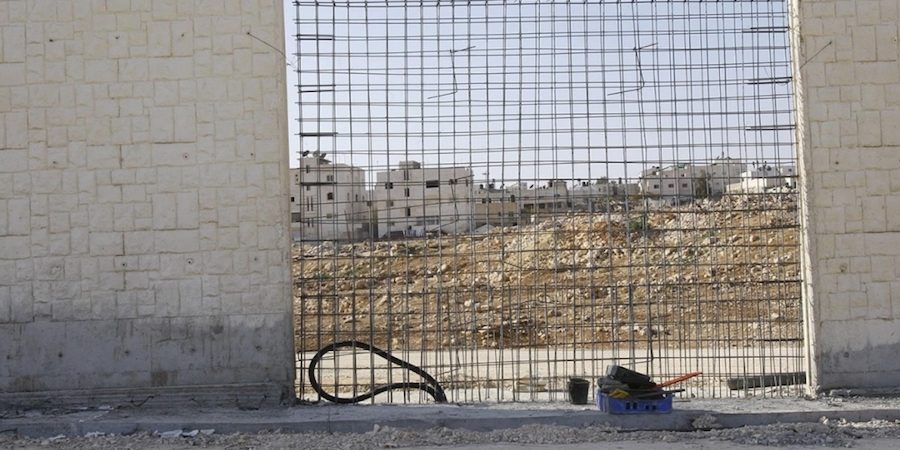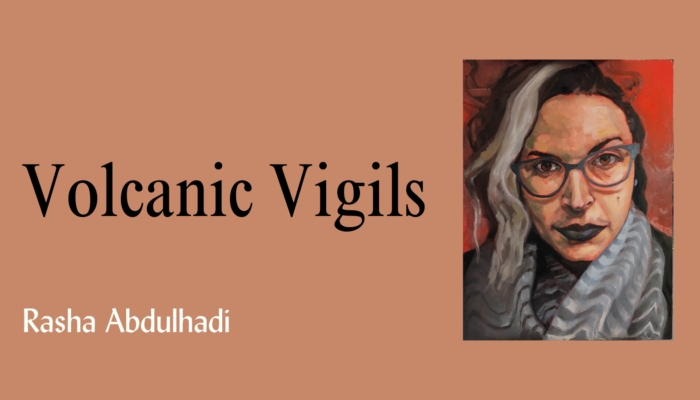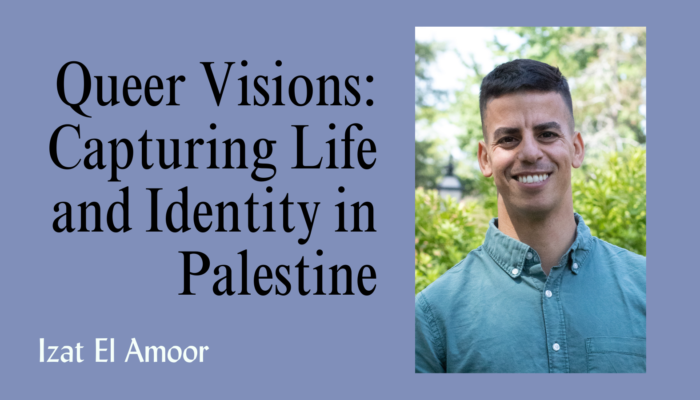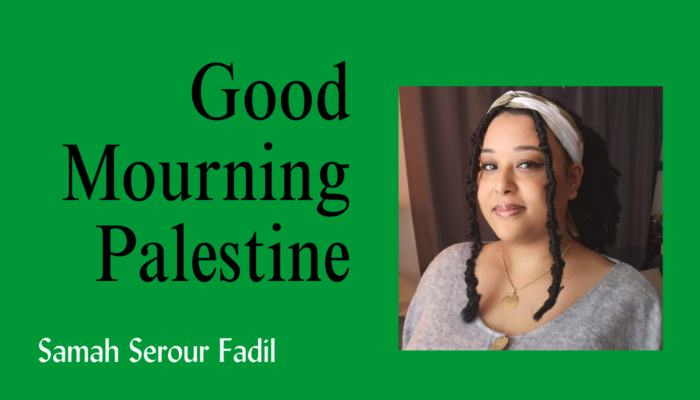In which you do not ask the state of Israel to commit suicide
The officers, speaking harsh fragments of Hebrew, run your boots back and forth several times through the security scanner. After carefully inspecting the zipper, they decide to place your shoes in a metal tray and slide them to you. You are given a red badge to wear with your name printed in bold font. They keep your passport at the front desk. You are instructed not to ask questions.
You proceed to a waiting area, while the officers inspect your classmates, two-by-two, in 5 to 15 minute intervals. Slowly, the waiting room begins to fill with familiar faces; your American classmates, marked with blue badges and blue passports in their hands.
A sign reading Israeli Ministry of Foreign Affairs: security cameras in use prompts your friend to joke about the room being bugged. It is important to mention that she is also wearing a red badge. Both the humor and exhaustion in her statement are familiar. Or maybe she reminds you of home.
Eventually, you are ushered out of the cramped waiting room and into a large lecture hall. A dark-skinned woman stands at the podium. You see her last name flash across the screen and are relieved by the familiar space it occupies in your mouth.
The woman introduces herself as an Iraqi Jew who was now a political law advisor to the Israeli state. She begins explaining her job and the difficult legal nuances of counter-terrorism; how international law forbids targeting civilian infrastructure in combat. Hence, the terrorists tend to use international law to their advantage. Hence, war places unfair pressure on Israel to operate on the higher moral ground.
The distinction between this woman and a terrorist was a matter of semantics; she had a terrorist name, spoke the terrorist’s language, even grew up living among terrorists. And now, she was the one dropping the bombs on the terrorists, on behalf of a state who viewed her as the acceptable kind of terrorist.
The woman was only the first of several speakers, the rest of whom were white. The speeches begin to blur, as the politicians recited similar, rehearsed arguments, none of which were unfamiliar to you. Your haze breaks when the last speaker, a white-haired man, starts answering questions from the audience and says, “1948 happened. 1967 happened. And we won. This is war, I mean, history tells us things like this just happen.”
The words escape him without the slightest hint of remorse. His stare, gray and rigid as stone; the kind of cold only a politician can know. You lock eyes with the Palestinian woman to whom he responded.
“So what you’re saying is, my mother, who was born in Haifa, cannot return to her home, but any random American Jew can?” The exhaustion in her voice was familiar to you.
“Listen,” the man sighs and removes his glasses. “I don’t know your mother, but I assume she can find a home in another Arab country; that’s how war works. If we were to accommodate every refugee who claims this land, that would be a logistical improbability. That would, in essence, be asking the state of Israel to commit suicide. I hope this answers your question.”
You wanted to say you were surprised by all of this, but in truth you were just numb. Or maybe the language escaped you.
An hour later, you are ushered out of the building by a woman who is introduced to you as an intern. You attempt to make small talk with her, only to receive half smiles and nods. The security guard up front hands back your passport in a small metal tray. “She doesn’t speak your language,” the guard explains.
***
“What you have to understand about 1948 is they not only destroyed our village; they destroyed our lives.” Yacoub’s voice crackling through the bus mic’s static almost resembled your grandfather’s. The way he’d pause and let “ya’ani” bridge the countries in his sentences: “ya’ani, this was my home. My childhood. My paradise.”
The bus shifts left to exit, Hebrew signs painting the side of the road, as you approach what remains of Lifta: mountainside speckled with stone remnants, structures half-standing, swallowed by the overgrowth.
Your moments in Lifta begin to blur: first, the descent, steep, as if the land itself was beckoning your return. Then, the runoff – you see a white man bathing in the desolate remains of a spring. Another Israeli man is reading a newspaper. He sits on a boulder as if he didn’t know a house once stood there.
“This is the house where I grew up; that used to be the bakery downhill,” Yacoub points onward as the rest of the class lags behind. In the distance, a building gapes like God smashed his fist down its frame in a tantrum.
As you near the hill’s bottom, Yacoub points to the opposing hillside: “that hill – ya’ani – is where my father and his fathers were buried. The waste… Ya’ani… Sewage from Jerusalem runs down the hillside and erased his grave marker.” You ask yourself, how many times has the state of Israel asked Palestinians to marvel at their own land’s suicide?
You reach the bottom. In the distance, there is a playground with a newly renovated park, speckles of white children running around. “The government started building a, a… Ya’ani, a new Israeli Quarter at the base of our village. This is our land, but they want to pave over it. We are fighting them, ya’ani, in the courts… But the construction has already begun.”
You ask again: how many times has the state of Israel forced Palestinians to abandon their own; to have their very conception of home paved over and forgotten?
It is important to mention that, on your way to the bus, Yacoub points out a hybrid tree species that produces both almonds and berries. It is the result of decades of competition between an invasive species, and a fruit gene indigenous to the region; two lineages, intertwined into a finite body, refusing erasure. Science says that there are two likely outcomes to such speciation: either one species will conquer the other, or another entirely new species will emerge over generations. Yacoub calls it a genetic anomaly. A miracle of God.
***
Six months later, you are back in your American college campus. The gaze of a hundred eyes, fixed on you and the equations displayed in light behind you; both are a language of their own. A vial filled with Lifta’s soil hangs on a strand around your neck. You feel it against your chest as you speak to the audience in their own language of proof and theorem.
You reference an equation from a paper in your hand, and as you glance down, notice TECHNION UNIVERSITY OF ISRAEL dominating the top of the page.
“Their argument was a logical fallacy, so in a sense, the paper authors cheated. They’re Israeli, so I suppose it makes sense.”
You don’t know why the words slip out of your mouth. And, for a second, time ceases to exist, and you are not a mere college student defending his thesis, but instead a Palestinian college student defending his thesis to a wall of petrified, white faces. Maybe it being Israeli Independence day weighed heavy on you. Or maybe every day is Israeli Independence day, and your ancestors slipped out of your throat. Maybe it was the soil, hanging from your neck like a key might. It is often the case that Palestinians who fled during the nakba still have the keys to their homes, even if their homes are no longer standing. In either case, there is always a mourning; there is always the lack of home placing a weight around your neck, a bullet in each word that escapes you.
A well-intentioned white professor pulls you aside after your presentation and lectures you on professionalism. You want to tell him your history; how Technion’s existence is at the expense of your ancestor’s land and lives, both of which they no longer have access to; how this same university makes an open-air laboratory of Gaza and calls them the necessary expense.
How, despite all of this, you are expected to sit docile, as your own academic institution funds the crumble and rupture of a land you called home. As if this same academic institution didn’t turn their back when the Birthright campaign and other friends of Israel threatened to put the Arab students on a watchlist. As if this same institution didn’t try to swallow you into the night’s mouth, tempting a moonlit suicide attempt from you, or that copy of you who craved most an escape that night. Were you to die, would they write you into a boy on a godless ledge, and speak not of the demons you fled, or the gravity forming a hollow country in your heart? Or would they say you were just abandoning your body; would they say, “this is war, I mean, depression. Things like this just happen?” Would they remember, first, the history and not the body it haunted?
But you are not the self you survived, nor are you the version of yourself who takes in words of the white professor, who you remind yourself, is well-intentioned. You are, instead, the copy of yourself you found at the entrance to the Aida refugee camp, six months prior, taking a selfie in front of a life-size statue of a key. While you are off being the literal Palestinian diasporic stereotype, your white classmates give candies to children walking in the streets, and ask to take selfies with them. The children hold up 2 fingers next to their saviors in the photographs. #PeaceInTheMiddleEast. 128 likes on Instagram.
Inside the camp, a youth program director tells you about the role of art in the lives of the Palestinian refugee communities. “We began to notice our children were born into such desperate conditions that they dreamt of no other reality than becoming martyrs. It was our goal to teach our children that they could live for Palestine; that they didn’t have to die for their country.”
And at this point, all past, present, and future selves of you converge, as you ask again how many times the state of Israel brought Palestinians to the brink of suicide; how the state instilled a learned helplessness in you; how the state molded you into the monster they always feared you to be, the monster you always feared in yourself. What of the self can exist outside a political rhetoric which, at best, will write you into something nonexistent?
***
As they are written, Israeli zone laws give the state legal control over the hilltops, aquifers, and other natural land resources in the West Bank. This is how the state writes Palestinian ethnic cleansing into “abandonment,” hence “legal,” hence “digestible” in some sense of the word.
For instance, Palestinian homes are not connected to Israel’s central water system. 40 gallon tubs of water are sold to Palestinian families at 10 times the price Israelis pay. As you drive through the land, you can immediately discern which houses are Palestinian and which are Israeli – the Palestinian houses bearing the mark and weight of black water tanks, like lamb blood on a front door; as if the partition of water hasn’t always been the difference between holy and crucified.
You arrive at your destination: a cramped UN office, responsible for monitoring the environmental situation in Gaza. A man tells you how Israeli scientists monitor and control the net sum of water and caloric content of food entering Gaza. This is how the state legalizes experimentation on Palestinian bodies; they ensure that just enough food is distributed to keep people alive, in case anyone accused them of starving you out. In case you wanted to engineer an escape with your own hands – when locked on 3 sides by wall, the only place you could turn to was a sea who betrayed you. The story is too familiar now. The unholy betrayal of fluid is how history makes an open-air prison of home, of country; call it, sink or swim; or, Unidentified UN Report stating, “the Gaza strip will be environmentally uninhabitable by 2020.”
In the case you would try to escape and abandon your own, history says you will become the next unidentified Palestinian thing to disappear into an Israeli jail. The newspaper headlines talk of Israelis holding barbecues outside of prisons housing Palestinians who were on a hunger strike. In case you were to forget the way they not only stole your land, but dance on it too.
***
There is a small village in the central West Bank named Nabi Salih. Due to the village’s location, Israeli zone control regulations make state-sponsored housing demolitions legal on this land: another suicide, placed on your people’s shoulders by the state.
In the case that the stubbornness clings to you and you refuse your home’s literal destruction, your home becomes a riot. This is how the state will beat you until your bones cannot heal themselves. In both resistance and compliance, you are still asked to make a massacre of home.
For the past few years, the residents of Nabi Salih began protesting home demolitions every Friday. A month before your arrival, you shared a viral video of a Palestinian teenager named Ahed Tamimi, who would often organize and attend such protests. You called her a hero. The recent history says, she was taken from her home in the middle of the night, her parents beaten half to death, and is currently being prosecuted in an Israeli prison with her mother.
As it is written, the history says you invited the soldiers and their tear gas into your living room. The history goes, children are often shot or injured in tear gas canister explosions. As it is written, the history says this is still your fault; says, your children suffered at the expense of your stubbornness.
The woman invites you into her rebuilt house and explains all of this to you, because you are not her; there is nothing connecting you but your stubborn blood, diluted, and the hyphenated American identity you un-inherited. Because you are not her, or Ahed Tamimi, or any other Palestinian taken into the night, you can write this testimony, and although it will never become History, it is a history nonetheless. Were you to disappear, there would at least be a body and country to mourn. There is no metaphor for this learned helplessness because the people of Palestine are always prisoner, here, in their own home.
***
After taking in both the histories and its erasures forced upon you, this want and love for the land your ancestor’s made nostalgia of, you end your journey in Jaffa – a town on the Mediterranean sea coast. You strip to your bare skin and walk into the sea for the first and perhaps the last time. You close your eyes and there is only quiet. A solemn quiet, but not a lonely one; these waters that no longer belong to you, cradling your body, in all its unfamiliar, and all the history running through you: the ghost of your grandfather’s smile, his laughter waning like sunset; the ghost of your grandmother’s baptism and her Jerusalem; the weight of all your family and all their ghosts that could not exist here.
When all is done, you will go back to your country. You will retreat to western diplomacy and it will fail you. Again. You haven’t a language in which this trauma is both digestible and reconcilable.
Suppose, instead, you began this by demanding the return of your rightful home and land, at the expense of the Israeli state. In that case, you would be asking for the destruction of the state who stole that home and forced death upon you, but the reality is this narrative is never mentioned because this narrative has no language digestible to western diplomacy, hence no space to call its own. Your demands for the dissolution of the Israeli state are always labelled “a suicide,” despite that you are not advocating for bloodshed; despite all the suicides the Israeli state has forced upon Palestinians. This would be the predictable ending; the ending your oppressor expects.
So, out of necessity in this logical framework, you do not ask the state of Israel to commit suicide because you cannot ask the state of Israel to commit suicide. By choosing this path, your words become the ivory paving over Lifta, the tear gas canisters making a hollow echo of Nabi Salih, the steel-tipped boots of soldiers who first kicked your own grandparents out of their house. This would mean ignoring history at your own expense; would mean writing yourself into something nonexistent.
In any case, you haven’t a home to call your own, nor do you exist in a reality in which you can reclaim the home you deserve. Hence, you are told to rebuild, like your parents have rebuilt, survive like your ancestors have survived. And even that is its own type of amnesia: rebuild home long enough to see your oppressor in its walls and eventually your own veins. Or escape. In any case, your oppressor has successfully engineered a reality in which you cannot see yourself existing.
Hence you arrive at a contradiction: you exist hence you survived, without a language to name that survival history. Hence, any attempt to give existing language to that history would be to give your oppressor agency over your history hence write yourself out of History. To ask the oppressor to stop killing your people would be to ask the impossible; would be to beg wine out of a water that has failed you. Your ancestors have tried, time and time again. And failed.
Hence, you are stuck between the present reality and a utopia where you have a land to call home, or at least, one where your homes converge into one body. So you are trapped, by necessity, in this unsolvable binary between what is owed and what is realistic; between what is deserved and what is expected.
Proof that an equation is unsolvable in a given logical framework is of infinite value, compared to a solution damned to contradiction. Peace cannot be achieved through dialogue when one side has two guns at their temple: one held up by the oppressor, the other held by the oppressed.
In any case, the blood is always on your hands.
In any case, the blood is always your own.




